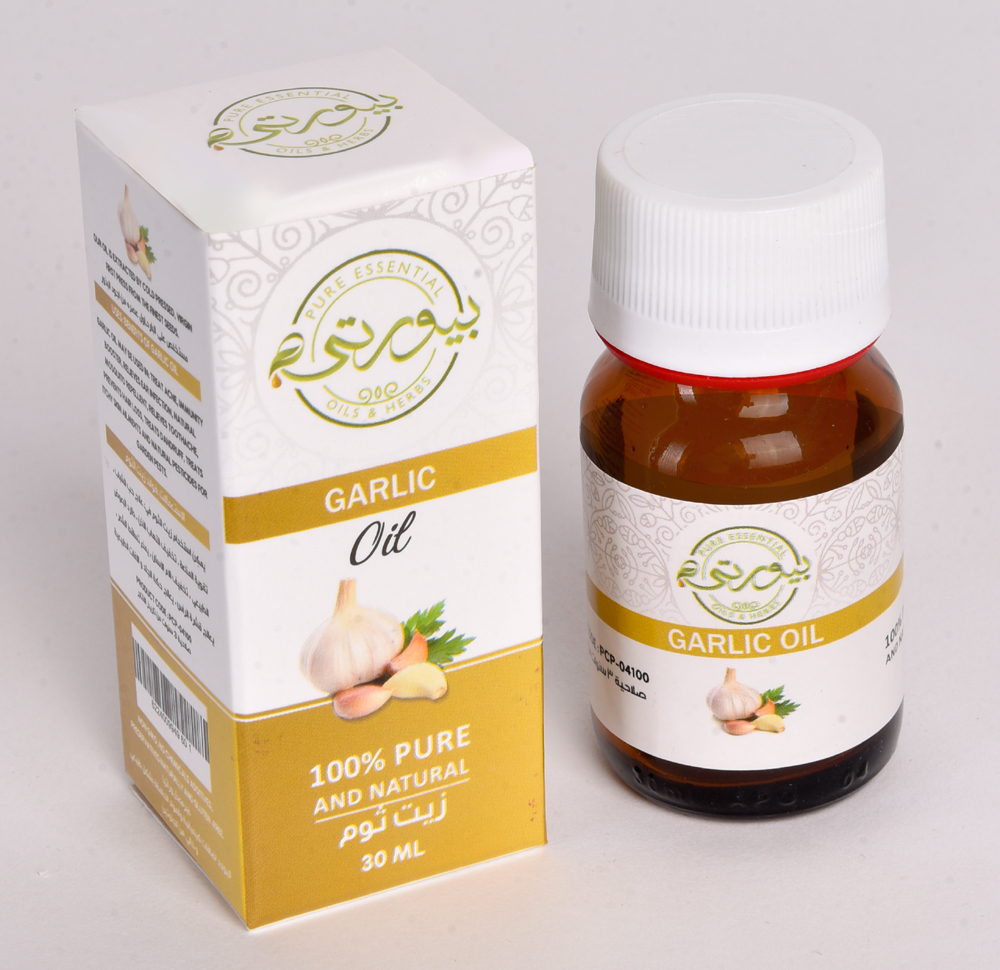Garlic Infused Oil Garlic bulb or oil infused in Carrier Oil)
Login to view prices
Garlic infused Oil, consists of a carrier oil that has been permeated (“infused”) with Garlic bulb or mixed with Garlic essential oil . The benefit to using an infused oil as opposed to a plain carrier oil is that the infused oil will contain the properties of both the carrier oil and Garlic bulb and is suitable for direct use for consumer
This Product for Consumer Retail packaging. if you are interested in Bulk Packaging to buy the oil as raw material, Please browse our Raw Materials and B2B Category
What is Infused Oil?
An infused oil, also referred to as a macerated oil, consists of a carrier oil that has been permeated (“infused” or “macerated”) with one or more herbs or the essential oil of that herb. The benefit to using an infused oil as opposed to a plain carrier oil is that the infused oil will contain the properties of both the carrier oil and the herbs or essential oil and is suitable for direct use for consumer without lot of precautions like concentrated essential oils
Some plants do not have much essential oil contained in them, and in those cases, it is rare or impossible to commercially find an essential oil for that plant species. Infusing the herb into a carrier oil, however, can be a suitable way to still use the herb for aromatherapy purposes.
Infused oils generally have an oily feeling that varies depending on the carrier oil used. They also are not as concentrated as essential oils.
====================
Overview
Garlic Contains Compounds With Potent Medicinal Properties Garlic is a plant in the Allium (onion) family.
It is closely related to onions, shallots and leeks. Each segment of a garlic bulb is called a clove. There are about 10–20 cloves in a single bulb, give or take. Garlic grows in many parts of the world and is a popular ingredient in cooking due to its strong smell and delicious taste. However, throughout ancient history, the main use of garlic was for its health and medicinal properties. Its use was well documented by many major civilizations, including the Egyptians, Babylonians, Greeks, Romans and Chinese . Scientists now know that most of its health benefits are caused by sulfur compounds formed when a garlic clove is chopped, crushed or chewed.
Perhaps the most famous of those is known as allicin. However, allicin is an unstable compound that is only briefly present in fresh garlic after it’s been cut or crushed Other compounds that may play a role in garlic’s health benefits include diallyl disulfide and s-allyl cysteine. The sulfur compounds from garlic enter the body from the digestive tract and travel all over the body, where it exerts its potent biological effects.
SUMMARY
Garlic is a plant in the onion family that’s grown for its distinctive taste and health benefits. It contains sulfur compounds, which are believed to bring some of the health benefits.
2. Garlic Is Highly Nutritious But Has Very Few Calories
Calorie for calorie, garlic is incredibly nutritious.
One clove (3 grams) of raw garlic contains (5Trusted Source):
Manganese: 2% of the Daily Value (DV)
Vitamin B6: 2% of the DV
Vitamin C: 1% of the DV
Selenium: 1% of the DV
Fiber: 0.06 grams
Decent amounts of calcium, copper, potassium, phosphorus, iron and vitamin B1
This comes with 4.5 calories, 0.2 grams of protein and 1 gram of carbs.
Garlic also contains trace amounts of various other nutrients. In fact, it contains a little bit of almost everything you need.
SUMMARY
Garlic is low in calories and rich in vitamin C, vitamin B6 and manganese. It also contains trace amounts of various other nutrients.
3. Garlic Can Combat Sickness, Including the Common Cold
Garlic supplements are known to boost the function of the immune system. One large, 12-week study found that a daily garlic supplement reduced the number of colds by 63% compared to a placebo (6Trusted Source). The average length of cold symptoms was also reduced by 70%, from 5 days in the placebo group to just 1.5 days in the garlic group.
Another study found that a high dose of aged garlic extract (2.56 grams per day) reduced the number of days sick with cold or flu by 61%. However, one review concluded that the evidence is insufficient and more research is needed (8Trusted Source).
Despite the lack of strong evidence, adding garlic to your diet may be worth trying if you often get colds.
SUMMARY
Garlic supplements help prevent and reduce the severity of common illnesses like the flu and common cold.
4. The Active Compounds in Garlic Can Reduce Blood Pressure
Cardiovascular diseases like heart attacks and strokes are the world’s biggest killers. High blood pressure, or hypertension, is one of the most important drivers of these diseases. Human studies have found garlic supplements to have a significant impact on reducing blood pressure in people with high blood pressure. In one study, 600–1,500 mg of aged garlic extract was just as effective as the drug Atenolol at reducing blood pressure over a 24-week period Supplement doses must be fairly high to have the desired effects. The amount needed is equivalent to about four cloves of garlic per day.
SUMMARY
High doses of garlic appear to improve blood pressure for those with known high blood pressure (hypertension). In some instances, supplements may be as effective as regular medications.
5. Garlic Improves Cholesterol Levels, Which May Lower the Risk of Heart Disease
Garlic can lower total and LDL cholesterol. For those with high cholesterol, garlic supplements appear to reduce total and/or LDL cholesterol by about 10–15%
Looking at LDL (the “bad”) and HDL (the “good”) cholesterol specifically, garlic appears to lower LDL but has no reliable effect on HDL.
High triglyceride levels are another known risk factor for heart disease, but garlic seems to have no significant effects on triglyceride levels (13Trusted Source, 15Trusted Source).
SUMMARY
Garlic supplements seem to reduce total and LDL cholesterol, particularly in those who have high cholesterol. HDL cholesterol and triglycerides do not seem to be affected.
6. Garlic Contains Antioxidants That May Help Prevent Alzheimer’s Disease and Dementia
Oxidative damage from free radicals contributes to the aging process. Garlic contains antioxidants that support the body’s protective mechanisms against oxidative damage. High doses of garlic supplements have been shown to increase antioxidant enzymes in humans, as well as significantly reduce oxidative stress in those with high blood pressure. The combined effects on reducing cholesterol and blood pressure, as well as the antioxidant properties, may reduce the risk of common brain diseases like Alzheimer’s disease and dementia.
SUMMARY
Garlic contains antioxidants that protect against cell damage and aging. It may reduce the risk of Alzheimer’s disease and dementia.
7. Garlic May Help You Live Longer
The potential effects of garlic on longevity are basically impossible to prove in humans. But given the beneficial effects on important risk factors like blood pressure, it makes sense that garlic could help you live longer. The fact that it can fight infectious disease is also an important factor, because these are common causes of death, especially in the elderly or people with dysfunctional immune systems.
SUMMARY
Garlic has known beneficial effects on common causes of chronic disease, so it makes sense that it could also help you live longer.
8. Athletic Performance Might Be Improved With Garlic Supplements
Garlic was one of the earliest “performance enhancing” substances. It was traditionally used in ancient cultures to reduce fatigue and enhance the work capacity of laborers. Most notably, it was given to Olympic athletes in ancient Greece (1Trusted Source). Rodent studies have shown that garlic helps with exercise performance, but very few human studies have been done. People with heart disease who took garlic oil for 6 weeks had a 12% reduction in peak heart rate and better exercise capacity. However, a study on nine competitive cyclists found no performance benefits. Other studies suggest that exercise-induced fatigue may be reduced with garlic.
SUMMARY
Garlic may improve physical performance in lab animals and people with heart disease. Benefits in healthy people are not yet conclusive.
9. Eating Garlic May Help Detoxify Heavy Metals in the Body
At high doses, the sulfur compounds in garlic have been shown to protect against organ damage from heavy metal toxicity. A four-week study in employees of a car battery plant (excessive exposure to lead) found that garlic reduced lead levels in the blood by 19%. It also reduced many clinical signs of toxicity, including headaches and blood pressure. Three doses of garlic each day even outperformed the drug D-penicillamine in reducing symptoms.
SUMMARY
Garlic was shown to significantly reduce lead toxicity and related symptoms in one study.
10. Garlic May Improve Bone Health
No human studies have measured the effects of garlic on bone loss. However, rodent studies have shown that it can minimize bone loss by increasing estrogen in females. One study in menopausal women found that a daily dose of dry garlic extract (equal to 2 grams of raw garlic) significantly decreased a marker of estrogen deficiency. This suggests that this supplement may have beneficial effects on bone health in women. Foods like garlic and onions may also have beneficial effects on osteoarthritis.
SUMMARY
Garlic appears to have some benefits for bone health by increasing estrogen levels in females, but more human studies are needed.
11. Garlic Is Easy to Include in Your Diet and Tastes Absolutely Delicious
The last one is not a health benefit, but is still important. Garlic is very easy (and delicious) to include in your current diet. It complements most savory dishes, particularly soups and sauces. The strong taste of garlic can also add a punch to otherwise bland recipes. Garlic comes in several forms, from whole cloves and smooth pastes to powders and supplements like garlic extract and garlic oil. However, keep in mind that there are some downsides to garlic, such as bad breath. There are also some people who are allergic to it.
===============
What are carrier oils?
Carrier oils and essential oils are made from plants. Carrier oils are used to dilute essential oils and “carry” them to your skin. That’s because essential oils are potent and can cause irritation when applied directly to your skin.
Most carrier oils are unscented or lightly scented and don’t interfere with an essential oil’s therapeutic properties. They may be used alone or with other oils to nourish your skin.
What examples of carrier oils we use to make our infused oils?
1. Coconut oil
Coconut oil is an edible oil made from the meat of mature coconuts. It’s available in refined or unrefined varieties. Unrefined coconut oil comes from fresh coconut meat. It’s not processed with chemicals and retains its coconut aroma and flavor. Refined coconut oil comes from dried coconut meat, also called copra. It’s bleached and deodorized to remove contaminants, as well as the distinct coconut aroma and flavor. Refined coconut isn’t all-natural and isn’t recommended for use as a carrier oil.
Uses: Coconut oil contains skin-nourishing fatty acids and polyphenols, which make it a great carrier oil for massage oils and skin care preparations.
2. Jojoba oil
Jojoba oil comes from the seeds of the jojoba plant. It has a delicate, nutty aroma. Technically, jojoba isn’t an oil, but a wax with powerful moisturizing properties. It’s thought to closely mimic sebum, the skin’s natural oil. Using jojoba oil may help reduce the skin’s oil production in acne-prone people by making the skin think it’s produced enough oil.
Uses: Jojoba oil absorbs easily in the skin and doesn’t clog pores. This makes it a good carrier oil option for massage oils, facial moisturizers, and bath oils.
3. Apricot kernel oil
Apricot kernel oil is made from apricot seeds, also known as kernels. It’s an emollient oil high in fatty acids and vitamin E. It absorbs easily into the skin and has a slightly sweet, nutty scent. You can buy edible apricot kernel oil, or apricot kernel oil for cosmetic use only.
Uses: Apricot kernel oil is thought to help soften and calm irritated, itchy skin. Use it as a carrier oil to make massage oils, bath oil, and hair care preparations.
4. Sweet almond oil
Sweet almond oil has a strong, nutty aroma. It’s an edible oil made from the kernels of sweet almonds. The oil is lightweight and absorbs easily, and is a great moisturizer for dry skin.
It’s also used in general aromatherapy, but its strong scent may mask an essential oil’s aroma.
Uses: Sweet almond oil is one of the most popular carrier oils for skin care. It’s great in massage oils, bath oils, and soaps.
5. Olive oil
Olive oil comes from pressed olives. It’s best known as a healthy, edible oil with a fruity aroma, but it’s also used in aromatherapy as a carrier oil.
Extra-virgin olive oil is the preferred variety for aromatherapy and skin care preparations. Olive oil’s scent may interfere with the scent of some essential oils.
Uses: It’s packed with fatty acids and plant sterols, which make it great for cleansing and moisturizing dry skin. Use olive oil as a carrier oil for massage, facial cleansers, hair care, and homemade soaps.
6. Argan oil
Argan oil is made from kernels found inside the fruit of argan trees, which are native to Morocco. The oil is edible and is traditionally used to nourish the body inside and out. It has a nutty aroma and is rich in vitamins A and E, and monounsaturated fatty acids.
Uses: Argan oil can help treat dry skin and hair, wrinkles, and skin inflammation. This makes it a terrific carrier oil for general skin care and massage oils.
7. Black seed oil
Black seed oil is made from the Nigella sativa plant. Although it’s lesser known than other carrier oils, it’s richTrusted Source with unsaturated and saturated fatty acids. It’s also thought to have anti-inflammatory abilities.
Uses: Black seed oil is often used as a folk remedy to soothe skin conditions including eczema, acne, and psoriasis. With this in mind, it’s a great choice for facial care, massage oils, and general skin care.
=================================================
Quotation:
· Quantity: There minimum order per each packaging type. kindly contact us to know more details and discuss the best options for you
· Specification: 100% natural and Pure quality Organic or Conventional
· Documentation: COA, MSDS, TDS,.. Kindly see more information tab in the product page to see all documents available
· Payment terms: TT in advance to Our bank account
· Lead time: Shipping through 10 days from receipt of the payment.
· Sea Shipping Time: 35 days
· Air shipping time: 10 days
Branding Services
We also can do customized packaging for you to bottle whatever size you like. We can help in designing labels, selecting good bottles, and packaging. We deliver integrated solutions under your brand..
Additional information
| Weight | N/A |
|---|---|
| Dimensions | N/A |
| Oil Purity | This is infused Oil. Plant, Flowers, Essential oil infused in natural Carrier oil |
| Country of Origin | China, Egypt |
| Ship from | China, Egypt |
| Cultivation Type | Organic, Conventional |
| Oil Retail Packaging | Size 15 ml , Pack has 12 bottles. Carton has 8 Packs = 96 bottles/carton, Size 30 ml , Pack has 12 bottles. Carton has 8 Packs = 96 bottles/carton, Size 60 ml , Pack has 12 bottles. Carton has 8 Packs = 96 bottles/carton, Size 125 ml , Pack has 6 bottles. Carton has 5 Packs = 30 bottles/carton, Size 250 ml , Pack has 6 bottles. Carton has 4 Packs = 24 bottles/carton, Size 500 ml , Pack has 4 bottles. Carton has 4 Packs = 16 bottles/carton, Size 1000 ml , Pack has 4 bottles. Carton has 2 Packs = 8 bottles/carton |
| HS Code | 330129477 |
| CAS-Code | 8000-78-0 |
| Oil Documentation Available | Allergen Free Certificate, Bovine Spongiform Encephalophathy (BSE) Certificate, Certificate of Analysis (COA), GMO Certificate, GRAS Status Statement, Halal Certificate, Herbal Origin Statement, KOSHER Certificate, Manufacturing Flow Chart, Material Safety Data Sheet (MSDS), Organic Certificate, Pesticide Residual Certificate, Researches & Studies, Technical Data Sheet (TDS), WADA Prohibited list Statement |
| Custom Branding & Packaging | Yes, OEM Custom banding, designing and packaging are available for that product |
| Bulk Packaging Availability | Yes we can provide you the product in Bulk Packaging |
-
Login to view prices
-
Login to view prices
-
Login to view prices
-
Login to view prices
-
Login to view prices

















